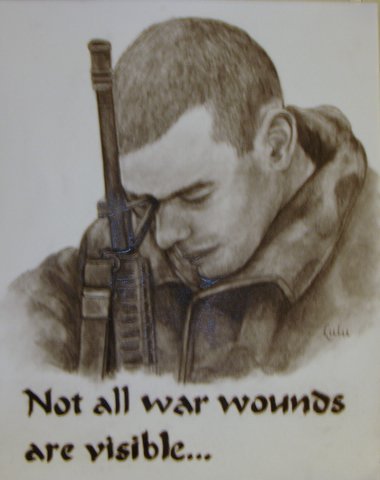
February 15, 2020
Mental health trauma has always been a part of war. It was called “shell shock” in former wars. Now it is called PTSD – “post-traumatic stress disorder.” But it is more than shell shock from blasts of the weapons. It is also the invisible injury that cripples men’s minds when they are forced to witness and participate in horrible crimes – murdering indiscriminately and destroying property. Blowing people to bits – not because they are trying to kill you, but because your leaders tell you that you must kill them.
This injures a man’s mind.
Also there is mental injury caused by military abuse called “training.” Soldiers in basic training (“boot camp”) are abused by drill sergeants who program them to think they are worthless, insignificant units like robots who must take orders and obey without using their own minds. They are converted, in a few weeks, from normal people into mindless killing machines.
This, also, injures a man’s mind.
This is why soldiers take their own lives. Their minds have been traumatized too badly.
Rosalind Williams’ 30-year-old son, Army veteran Corey Michael Hadley, took his own life.
It turned his mother’s world upside down in a moment of time. It was barely enough time for her to pick herself up and return to her Northeast High School classroom where she teaches science.
And yet in that small window of time, 900 other military parents were dealt the same blow — left behind to try to find the rhythm of a life that they lost after losing their children to suicide. According to the most recent data from the Department of Veterans Affairs, about 20 veterans, active-duty service members and members of the National Guard and Reserve, die by their own hand every day.
You see, Hadley’s mother didn’t lose him at the time he committed suicide. Rather, she lost him when he was inducted into the military. The military robs boys of their lives. Their lives are taken from them at that point. Hadley’s life was sacrificed to the military beast. It owned him. And that beast does not care about the lives it destroys – neither the lives of the people they blow to bits, nor the lives of the boys they send to do the dirty work.
In the quiet that followed the initial flurry of collective shock and grief after Hadley’s death on Jan. 2, his mother sat with her anguish. She went through old photographs, collected new ones from his funeral and military interment. She read, and reread, the numerous news stories written about her son after the family spoke about his death.
“His wounds were slow-acting and invisible, but nonetheless crippling and fatal,” the family said in a statement that spoke of his struggles with depression and PTSD after six years and three tours of duty in Iraq and Afghanistan.
She and the family struggled to find the right way and words to describe the loss of her son. Williams has continued to consider the cause of his death. His PTSD and the mental-health issues that medicines and other interventions failed to help — those were merely symptoms, torturous as they were, of what really ailed him. Instead, his mother believed: What finally cost him his life was the traumatic brain injury he suffered after the Army sharpshooter’s multiple deployments. Even in his final letter to his family, he spoke about it.
“I’m so sorry for doing this to you,” Hadley wrote. “I am so grateful to have been born into a loving, strong family.
“Sadly I’m not as strong as you may think I am. I have endured for as long as I could. My brain feels as though it’s swelling within my head. My ankles do not support my weight causing me to lose balance often and my heart … my heart feels as though there is a black hole in the center of it sucking in all positive emotions allowing them to never leave and me never truly feeling happiness.”
Hadley’s family knew his mental health had deteriorated after the infantryman and sharpshooter returned home in 2013. But the wounds he and so many others experience remain invisible to many, including the government and military that used him.
“Military men are just dumb, stupid animals to be used as pawns in foreign policy.”
―
Since 2000, more than 400,000 troops have been diagnosed with versions of traumatic brain injury, many of them as a result to being exposed to blasts. But as this article explains, many more soldier’s minds are damaged beyond repair by the cruel and abusive military experience itself.
______________________________________________________________

